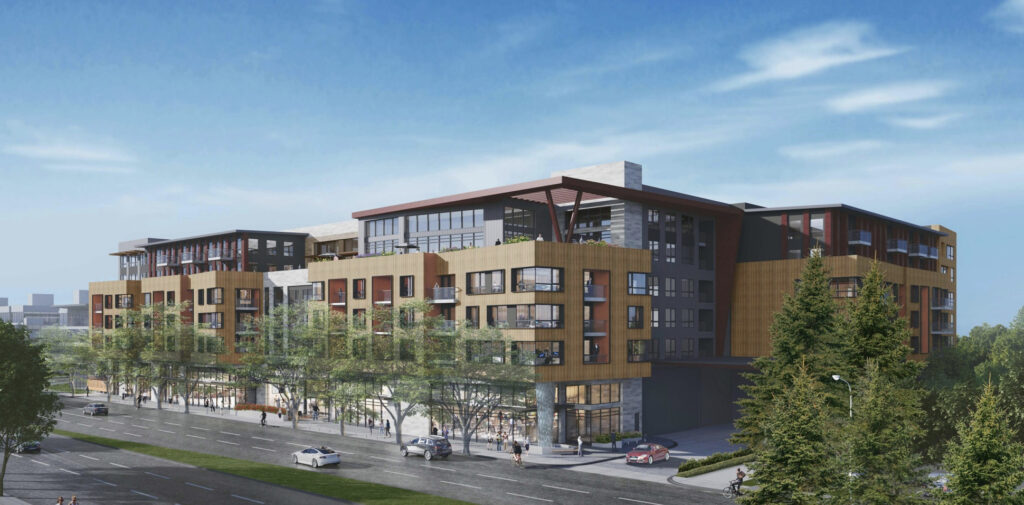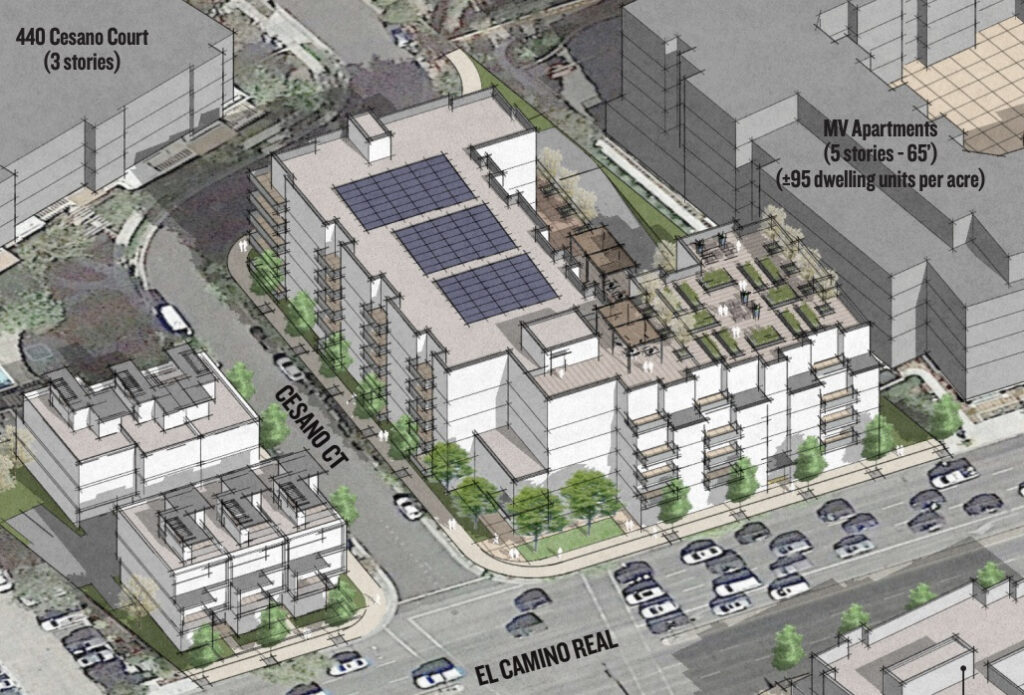The City of Palo Alto – is literally growing up – and is poised to welcome a wave of heightened sophistication in residential projects, particularly along a coveted stretch of El Camino Real just south of Page Mill Road. Unveiled to the City Council on October 4, a visionary proposal aims to redefine and gentrify the area between Page Mill and Matadero Avenue. Under this substantial proposal, the height limit for residential developments would rise to an impressive 85 feet, a substantial increase from the existing cap of 50 feet. Importantly, the building density would experience a twofold augmentation, escalating from the current 2.0 floor area ratio (FAR) to an elevated 4.0 FAR, facilitating the construction of additional apartments within these avant-garde projects. The FAR is a pivotal metric denoting the ratio of building area to land.

Local developer, Acclaim Companies, has an iconic apartment building project slated at 3150 El Camino Real, known colloquially as the Fish Market site, the proposed zoning standards echo the desires expressed in Acclaim’s application. This notable project envisions a seven-story structure reaching 84 feet in height with a FAR of 4.1, featuring 380 apartments.
Interestingly Acclaim’s intention is to leverage the “builder’s remedy” provision in the state code. This provision empowers developers to surpass zoning standards in municipalities lacking a certified Housing Element. Palo Alto has been unsuccessful in its submissions to the Housing Element to the state Department of Housing and Community Development which has left it susceptible to further builder’s remedy applications. The proposed relaxation of zoning limits on El Camino sites is a strategic move by Palo Alto, aimed at securing approval for its next submission to the Housing Element and demonstrating the capacity to meet its Regional Housing Needs Allocation target of 6,086 dwellings between 2023 and 2031.

This current proposal is grounded in pragmatism – and harsh reality – recognizing the limitations of the city’s current ambitious housing strategy, primarily concentrated around San Antonio Avenue and Fabian Way. These areas, predominantly zoned as general manufacturing or research, office, and limited manufacturing, have posed challenges, with HCD urging a comprehensive analysis of existing uses hindering residential development. There are many hurdles for the redevelopment of these properties even after the zoning issues are resolved.
There is a strategic benefit in this general location – the El Camino area addresses practical challenges – offering proximity to the city center, the California Avenue commercial area, a Caltrain station, and a VTA bus route. This central location minimizes concerns raised by typical housing advocates regarding transportation services, parks, and resident amenities in industrial zones.

This proposed expansion also brings the possibility of new housing development to Palo Alto Square, a sizable property at 3000 El Camino, currently housing a business park. The property owners have expressed interest in incorporating housing into existing parking areas could materialize into a transformative project, bolstered by the new focus area designation – one can only hope.
Several other housing projects in the city’s pipeline add to the dynamism of this evolving landscape, including an affordable housing development by Charities Housing, an educator-focused apartment project by Half Dome Capital, and townhomes by the Sobrato Organization at 3200 Park Blvd. These initiatives collectively contribute to Palo Alto’s strategic vision for an urban renaissance.

Landlords, property managers, and developers are anxiously awaiting the fallout of the City losing control over development due to the failure to meet the State requirements for additional units. This will play out over the next decade or so and will be fun to wait and watch the gentrification and changing El Camino corridor.
In search of a trustworthy and professional property management collaborator, Esquire Property Management Group exemplifies a steadfast commitment to adhering to legal and ethical protocols and are poised to help the growing needs of Palo Alto and Silicon Valley.
David currently is the broker/owner of several real estate related businesses which manage and maintain 300+ client properties on the San Francisco Peninsula.
Trust, transparency, and performance guarantees are the foundation of these businesses. David challenges anyone to find a PM professional that offers services similar - extensive education, customer service, and performance guarantees.
David also provides consulting for his clients on property development feasibility, construction, and complex real estate transactions.
David has authored a published law review article, three real estate books, and over 150+ real estate blog articles.
- “Wildfires, Insurance & Mortgages: Will Your Home Survive the Financial Aftermath?” - March 3, 2025
- What’s Driving California’s Commercial Real Estate Shakeup? - February 27, 2025
- Critical Issues in Triple Net Leases Investors Should Know - February 14, 2025

